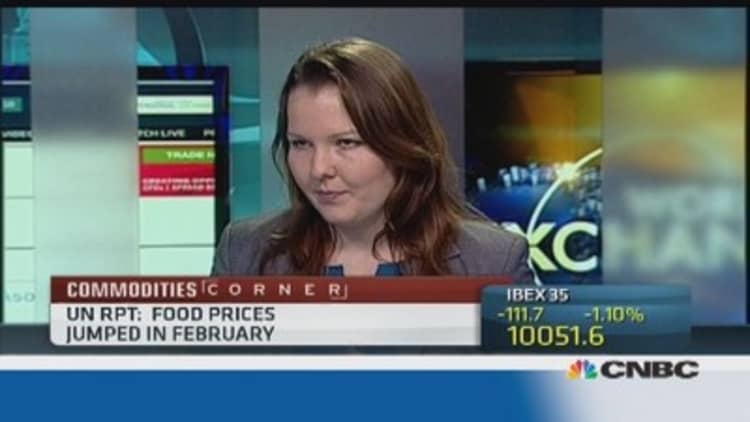There was little fanfare surrounding the 2014 farm bill signed into law last month by President Barack Obama.
But the massive provision—some 1,000 pages in length, and expected to run at nearly $1 trillion over the next 10 years—alters some sacred cows like crop insurance and commodity subsidies but gives items like hemp and even sushi rice a financial boost.
"I think the bill is an improvement and well needed," said John O'Brien, an agri-finance attorney at Snell & Wilmer, and a farmer who grows wheat and corn in eastern Colorado.
"The old bill didn't keep up with current conditions," he said. "Farmers are overall doing much better now, and eliminating direct payments from commodity subsidies that got paid out regardless of whether certain crops were grown, is good."
Will Delavan, a professor of economics at Lebanon Valley College, said that the new rules will help big farming operations more than small farmers.
(Read more:
"On paper, the cuts in commodity subsides are significant, but I don't really see them having a big effect," said Delavan. He explained that new subsidies will still be in place for crops that favor bigger farms—peanuts and corn, for instance.
"I think the smaller farmers get hurt in this as they have in the past," he said. "It's the same dynamics as before."
How it works
The 2014 farm bill cuts federal subsidies to farmers by some $12.7 billion from the previous farm legislation.
But subsidies will continue in some form. This April, farmers must choose between two subsidy programs: one based ondeclines in crop prices and one based on diminishing sales. Each farmer's choice will remain in effect for five years starting in 2015.
In a major shift, the farm bill provides more funding than ever in the form of premium subsidies for crop insurance in order to make it cheaper to buy. In theory, the idea is to move more risk to the farmer and away from taxpayers.
(Read more:
Farmers can take their chances and buy individual polices or tie their policies to a countywide system, but they can't have both.
Crops that were difficult to get insurance for in the past, specifically vegetables and fruits, will be easier to insure under the new law.
"A big winner in this is businesses that sell crop insurance," said Justin Gardner, a professor of agribusiness at Middle Tennessee State University.
Fruits and vegetables gain
Other major provisions in the bill include:
- Forcing farmers who want subsidies to follow soil and water conservation practices.
- Labeling meat products with details on where animals were born, slaughtered and processed as well as the country of origin.
- Giving financial support to research on developing organic and specialty crops.
- Easing a 75-year-old restriction on growing and researching industrial hemp (a variety of the cannabis plant).
- Giving subsidies for new crops such as sushi rice.
"The bill showed a real change in how we look at fruits and vegetables by giving farmers who grow them more access to insurance," said Kam Quarles, director of legislative affairs at the McDermott Will & Emery law firm. Quarles said he lobbied Congress on the farm bill on behalf of fruit and vegetable producers.
"There's more nutrition programs for kids in school with this bill, and that's a big change," he said.

'Big loss for kids'
But not all kids my be seeing those benefits. Another big change in the bill are cuts to the food stamp program, or what's now called the Supplemental Nutrition Assistance Program (SNAP).
After nearly two years of political fighting over the issue, which tied up passage of the farm bill, some $8 billion was finally cut from the SNAP budget.
(Read more: Meet the man behind the Perfect Bacon Bowl)
Darren Hudson, an agriculture professor at Texas Tech University, said that SNAP didn't take as big as hit financially as some had called for. "Now you have to apply for it separately. If you were on Medicaid, you were automatically qualified for food stamps," he said.
Moving markets?
In the end, experts said, the farm bill has something for everyone to like or dislike. But a sea change in agriculture is unlikely.
"I doubt this will affect the commodity markets one way or the other," Gardner said. "Besides, the big crop to watch market-wise is corn. Everything else is mostly secondary."
(Read more: Commodities trading)
Paul Mariani, a director at investment banking firm Variant Capital Advisors and an agriculture analyst, said the bill simply reflects a change in consumer attitudes.
"What this bill does more than anything is show how organics and specialty crops are in demand," he said. "Add to that consumer concerns over labeling, and you see where the money from this bill is going."
—By CNBC's Mark Koba. Follow him on Twitter @MarkKobaCNBC.



